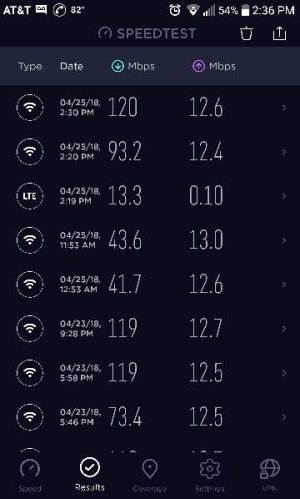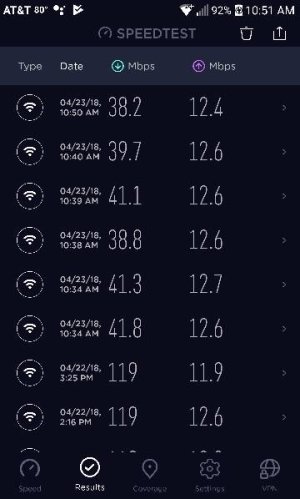I have noticed some slowness and that circular arrow chasing itself. I did a speed check and my Note 4 is getting 119 mb/sec, except for once a few days ago but the v20 has too many times at 40. And I tested both one right after another. I rebooted and got the same 41.
WiFi Slowness
- Thread starter dlcpa
- Start date
You are using an out of date browser. It may not display this or other websites correctly.
You should upgrade or use an alternative browser.
You should upgrade or use an alternative browser.
Rukbat
Retired Moderator
- Feb 12, 2012
- 44,532
- 46
- 48
40mbps is still about 8 times faster than the internet, so what happens, assuming that the server you're testing with happens to be very close to AT&T's local entry point to the backbone, is that you'll see a 40mbps download speed from that server, but normally AT&T will get a packet for you every .000002 seconds (which equates to 5mbps if I didn't slip a decimal point) and will send it to you at 40mbps, then wait a relatively long time for the next one. Your speed to AT&T is still 40mbps, but your thruput - the speed you're downloading from some server - is 5mbps. So unless your download drops to under 5mbps, or you're downloading and/or streaming a lot of files at once on some super-fast phone, it's not going to make any difference in actual use between 5mbps and 119mbps.
About the only time a connection like 119mbps makes any practical difference is with wifi, when you have 5 or 10 people streaming movies at once, or people downloading GB-size files at the same time others are streaming. Each one will be using 5mbps of that speed, so if there are enough things coming down the line, you can take advantage of that bandwidth. But phones aren't that fast, and the internet itself isn't that fast, so if you're streaming a video at 5mbps, all of a sudden streaming it at 119mbps isn't going to make the movie run faster - the server is still streaming it out at about 2mbps (or maybe 5mbps if you're watching a 4k stream).
Remember, download speed isn't an absolute, it's from somewhere. when the "where" changes, the speed changes. So you can measure speed using the Ookla app (or use a browser to go to speedtest.net) and get a really nice-looking speed, because they have servers all over the place, but the sites you're usually downloading from don't, so you're limited to the speed you can get from, say, Singapore or Illinois. (Use the Ookla app, change servers to someplace in Siberia or the middle of Africa, and watch your ping go up and your speed go down.)
But what you're seeing is why people are told to study statistics before running speed tests. For the one you posted you ignore the 119mbps (they're called outliers) and average the rest - and your download speed from the server you're testing from is 40.15mbps. (Not that an Ookla speed test really tells you anything - your real-world download speeds do.) The few burst of higher speed don't mean anything.
About the only time a connection like 119mbps makes any practical difference is with wifi, when you have 5 or 10 people streaming movies at once, or people downloading GB-size files at the same time others are streaming. Each one will be using 5mbps of that speed, so if there are enough things coming down the line, you can take advantage of that bandwidth. But phones aren't that fast, and the internet itself isn't that fast, so if you're streaming a video at 5mbps, all of a sudden streaming it at 119mbps isn't going to make the movie run faster - the server is still streaming it out at about 2mbps (or maybe 5mbps if you're watching a 4k stream).
Remember, download speed isn't an absolute, it's from somewhere. when the "where" changes, the speed changes. So you can measure speed using the Ookla app (or use a browser to go to speedtest.net) and get a really nice-looking speed, because they have servers all over the place, but the sites you're usually downloading from don't, so you're limited to the speed you can get from, say, Singapore or Illinois. (Use the Ookla app, change servers to someplace in Siberia or the middle of Africa, and watch your ping go up and your speed go down.)
But what you're seeing is why people are told to study statistics before running speed tests. For the one you posted you ignore the 119mbps (they're called outliers) and average the rest - and your download speed from the server you're testing from is 40.15mbps. (Not that an Ookla speed test really tells you anything - your real-world download speeds do.) The few burst of higher speed don't mean anything.
Rukbat, you lost me. Maybe I'm just too worn down by all this and this is following five straight attempts to get my Note 4 fixed by Samsung. I can't tell you this I bought an Xbox One S 2 play Madden with my great nephews in New York, I live in Delray Beach Florida. and when it was loading in the updates it was showing between 90 and 100 megabytes per second. So I'm not exactly following what you were saying. my stuff doesn't go back to AT&T even though AT&T gives me the service it goes to Comcast.
Old-Hatch, no I was not on 2.4 I'm always on 5. at the same time I was doing the 40 megabytes per second on the v20 the Note 4 was doing a hundred and nineteen. so I don't know what's going on because at times the v20 does show a hundred and nineteen.
I have to reread Rukbat's comment tomorrow.
Old-Hatch, no I was not on 2.4 I'm always on 5. at the same time I was doing the 40 megabytes per second on the v20 the Note 4 was doing a hundred and nineteen. so I don't know what's going on because at times the v20 does show a hundred and nineteen.
I have to reread Rukbat's comment tomorrow.
im using my V20 and my old S3 to run a speed test. Nothing's running on the back ground and I'm running the speedtest on both devices on the same spot near the modem.
S3 always get a faster speed than V20 and the gap is always higher than 7mbps..
Also, my V20 will also disconnect when streaming a video while my S3 doesn't. Why??
that's my post here recently..
i get you..
S3 always get a faster speed than V20 and the gap is always higher than 7mbps..
Also, my V20 will also disconnect when streaming a video while my S3 doesn't. Why??
that's my post here recently..
i get you..
im using my V20 and my old S3 to run a speed test. Nothing's running on the back ground and I'm running the speedtest on both devices on the same spot near the modem.
S3 always get a faster speed than V20 and the gap is always higher than 7mbps..
Also, my V20 will also disconnect when streaming a video while my S3 doesn't. Why??
that's my post here recently..
i get you..
Niv, right now I just drove up to my villa and I am getting 119. The first time I did it, it was 93 and earlier it was 41 then earlier still 119. The real ow one was 4G lte. It seems erratic.
Where did you get your phone from? Mine was from Ebay.

Similar threads
- Replies
- 4
- Views
- 2K
- Question
- Replies
- 11
- Views
- 2K
- Replies
- 16
- Views
- 15K
- Replies
- 7
- Views
- 3K
- Question
- Replies
- 7
- Views
- 4K
Trending Posts
-
Question How to erase those thousands of thumbs in the cache on my Samsung Tablet S6 Lite?
- Started by androcubc
- Replies: 2
-
How do you guys purchase your phone? Directly from Samsung or from carrier?
- Started by blueyzfr6
- Replies: 16
Forum statistics

Space.com is part of Future plc, an international media group and leading digital publisher. Visit our corporate site.
© Future Publishing Limited Quay House, The Ambury, Bath BA1 1UA. All rights reserved. England and Wales company registration number 2008885.

